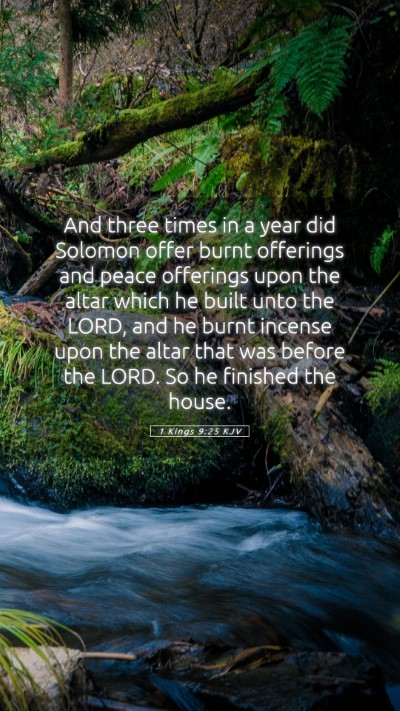Bible Verse Meaning and Commentary on 1 Kings 9:25
1 Kings 9:25: "And three times in a year did Solomon offer burnt offerings and peace offerings upon the altar which he built unto the Lord, and he burnt incense upon the altar that was before the Lord. So he finished the house."
Summary of 1 Kings 9:25
This verse highlights the religious practices of King Solomon as he dedicated his altar to the Lord. The verse illustrates Solomon's commitment to maintaining his relationship with God through regular offerings and worship.
Bible Verse Meanings
- Religious Practices: Solomon's offerings signify his obedience and devotion to God, which were central aspects of ancient Israelite worship.
- Symbolism of Sacrifice: Burnt offerings and peace offerings were not merely ritualistic but represented a deeper spiritual communion with God.
- Significance of Incense: The burning of incense symbolizes prayer and presents the idea that Solomon sought God's favor and guidance through his acts of worship.
- Completion of the Temple: This verse marks a pivotal moment where Solomon acknowledges the fulfillment of building the house for the Lord, encapsulating the divine oversight in his reign.
Bible Verse Interpretations
According to Matthew Henry, Solomon’s sacrifices reflect both his devotion and the national religious practices, which stood as a model for Israel. Albert Barnes notes the significance of the regularity of these offerings, emphasizing continuity in worship as essential for a thriving relationship with God. Adam Clarke adds that Solomon's offerings illustrate not only personal piety but also the dedication of the nation to God through communal worship.
Bible Verse Understanding
This verse serves as a reminder of the importance of consistent worship and the act of giving in devotion to God. It emphasizes that one's spiritual life must be nourished through regular acts of faith, reflecting the understanding that worship is not a one-off task but an ongoing commitment.
Bible Verse Explanations
1 Kings 9:25 encapsulates Solomon’s efforts to ensure that the worship of God remained the central focus of Israelite life. The three annual pilgrimages for offerings were likely aligned with feasts described in the Law, thereby providing an explanation of why Solomon adhered strictly to this practice.
This verse underlies the theological significance associated with offerings; they were acts of recognition of God’s sovereignty and a token of fellowship between God and His people. It teaches modern readers the principle of prioritizing God in their lives through reverent acts of worship.
Cross References
- Deuteronomy 16:16: Discusses the national pilgrimage during feasts.
- 1 Chronicles 9:25: Affirms Solomon's commitment to sacred worship rituals.
- Exodus 30:7-8: Details the role of incense in worship before the Lord.
- 2 Chronicles 8:12-13: Further elaborates on Solomon’s offerings and the structure of his worship.
- Hebrews 13:15: Connects New Testament worship to the practices of sacrifice in praise.
Applications of 1 Kings 9:25
In applying the lessons from 1 Kings 9:25, modern believers are encouraged to reflect on their own practices of worship and offerings. This verse prompts one to consider:
- Consistency in Worship: Just as Solomon offered sacrifices regularly, believers are encouraged to maintain a disciplined life of worship and prayer.
- Recognition of God’s Sovereignty: The principle behind Solomon’s offerings can be applied to daily life as acknowledgment of God’s authority and provision.
- Community Engagement: Consider the role of communal worship and its importance in fostering a vibrant faith community.
Conclusion
In conclusion, 1 Kings 9:25 serves as a touchstone for understanding the heart of biblical worship and the nature of offerings in the context of commitment to God. Engaging with this verse through bible verse commentary and bible verse interpretations fosters an enriched Bible study experience. It encourages not only personal reflection but also a broader understanding of scripture as it relates to the life of faith.


